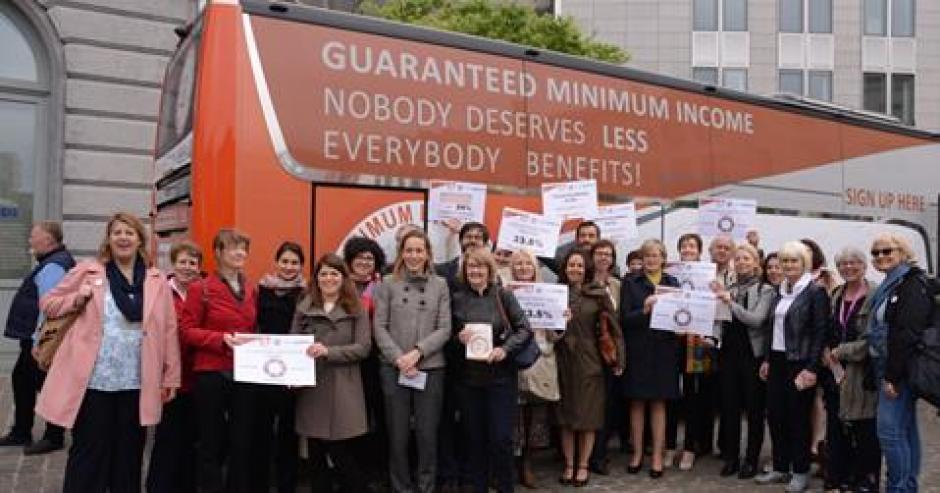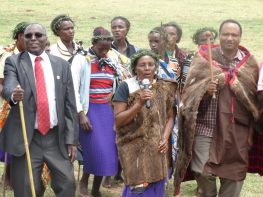Señor JUAN MANUEL SANTOS CALDERON
President of the Republic of Colombia
Ref: comply with the results of popular consultations
Mr. President,
As you are aware, on 26 of March 2017, the majority of the population in the municipality of Cajamarca, in a democratic popular consultation, expressed its rejection to the mining project “La Colosa,” concession which had been awarded to the multinational company AngloGold Ashanti.
Now we are concerned to learn of the declarations made by Germán Arce, Colombian Minister of Mines and Energy, which threaten sanctions against the councilors of the municipalities which have prohibited industrial mining and hydrocarbon exploration in their territories, via popular consultations. Our concern centers on the apparent disregard, evidenced by the Minister’s declarations, of the right of those communities to participation, affecting the rule of law and departing from the Colombian legal framework.
The Constitution of Colombia[1] recognizes the fundamental right of citizen participation and, in different sentences,[2] the Constitutional Court has clearly established the obligation to consult citizens regarding decisions related to mining, and has clarified the authority to determine the types of economic activity appropriate for each locality corresponds to the municipalities. Similarly, for the award of mining concessions in municipalities, these must be consulted by national-level authorities, taking into consideration their plans for territorial management. Finally, the Council of the State (Consejo de Estado)[3] has underscored the legitimacy of popular consultations as a form of citizen participation.
As a result, we consider the popular consultation as a clear mechanism of citizen participation recognized by the Colombian legal framework; it is an instrument through which an issue is presented to the people for their consideration so that they will make and express their decision, which shall be considered binding, consistent with Law 134 of 1994 and Law 1757 of 2015.
We also recall Colombia’s obligations according to international human rights law. As a State Party to the International Covenant on Civil and Political Rights, Colombia is bound to respect the right to freedom of expression, including to freedom to seek, receive and impart information and ideas of all kinds[4], the right of peaceful assembly[5] and the right to take part in the conduct of public affairs[6]. The International Covenant on Economic, Social and Cultural Rights, of which Colombia is also a State Party, establishes the right of self-determination[7], the right of everyone to the opportunity to gain his living by work[8], the right to physical and mental health[9] and the right of everyone to an adequate standard of living for himself and his family, including adequate food, housing and the continuous improvement of living conditions.[10] We understand that all of these rights are at stake with the large-scale mining projects which have prompted the organization of popular consultations in the country.
We also recall that, as a State Party to the above-mentioned treaties, Colombia has the duty to comply with the recommendation of the committees charged with supervising compliance with human rights treaties, such as the United Nations Human Rights Committee, which encouraged Colombia to adopt a law that guarantees that prior consultations are actually held in order to obtain the free, prior and informed consent of relevant ethnic communities before any measure that may have a substantial impact on their ways of life and culture.[11] The Committee on the Rights of the Child expressed concern to the State Party as a result of the negative impacts of activities conducted by business enterprises, particularly in the mining and tourism sectors[12], on the rights of children in Colombia, and recommended that the Colombian State (among other measures) adapt its legislative framework to ensure the legal responsibility of businesses and their affiliates operating in the territory of the State Party — especially in the mining sector — for the violation of the rights of children[13].
In light of the commitments established by Colombia’s legal framework and the international human rights system, the undersigned are aware and watchful over the decisions that will be taken.
Accordingly, we call on you, Mr. President, to:
- Respect and comply with the decisions taken by communities in the popular consultations of Cajamarca, Tauramena, Cumaral, Piedras y Cabrera (as well as others that may be conducted in the future) as a result of a democratic exercise supported by law.
- Respect and comply with the decisions taken by the municipal Counsellors of Támesis, Jericó, Doncello, Elías, Pitalito and Acevedo, which prohibit mining and oil exploitation in their territories, and respect all future decisions that come from other municipal boards.
- Refrain from presenting and approving proposed legislation or decrees that restrict or limit the constitutional right of Colombian people to democratic participation; popular consultation; free, prior and informed consent and the autonomy of territorial entities.
- Guarantee due process, as well as providing electoral support to all communities in the process of convening popular consultations in their municipalities.
- Guarantee the security of all leaders involved in the processes of popular consultations for the free exercise of the right to peaceful and legal protest, freedom of association and freedom of expression.
CC:
Srta. Annalisa Ciampi, Special Rapporteur on the rights to freedom of peaceful assembly and of association
Sr. David Kaye, Special Rapporteur on the promotion and protection of the right to freedom of opinion and expression
Sr. Michael K. Addo, President of the Working Group on the issue of human rights and transnational corporations and other business enterprises
[1] Artículo 105
[2] C-035/2016, C-389/2016 – T-704/16 – SU-133/17, entre otras
[3] Consejo de Estado. Sala de los contencioso administrativo. Sección cuarta. Expediente N°: 11001-03-15-000-2016-02639-00
[4] Article 19, 2
[5] Article 21
[6] Article 25 (a)
[7] Article 1
[8] Article 6, 1
[9] Article 12, 1
[10] Article 11, 1
[11] Concluding observations on the seventh periodic report of Colombia (CCPR/C/COL/CO/7, p. 43 (b))
[12] Concluding observations on the combined fourth and fifth periodic reports of Colombia (CRC/C/COL/CO/4-5) (p. 17)
[13] CRC/C/COL/CO/4-5, Article 18 (a) and (c)

